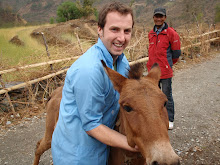In Hindu culture, the Cow is as sacred as many a God and it used to be a punishible offence to kill one, by accident or not. This must be the reason why farmers have strayed from the common cow as a major livestock animal and instead, uses the Water Buffalo.
Now she is a much bigger animal, similar to a hearty angus cow with much more distinctive features, compared to the rather diminuative stature of the local cow- You'd see bigger weanlings! She produces more milk and the average Hindu isn't as perturbed about eating her "buff" meat and using her hide. Although, the higher Brahmin, or priest caste would beg to differ.
But people still milk the local breed of cow here, giving 1-2L of milk a day at peak lactation, but what on earth becomes of the male calves if you can't eat them? Well bull calves are castrated early in life and VIVA is promoting more modern techniques of this practice. Then, twice a year they are woken from their slumber to plow the fields after the harvest. They can also pull carts. I've seen 12/14yr old bullocks knocking about. But for others, they lead a life like an unwanted child, roaming the streets of towns and cities (mainly round abouts) begging for leftovers, carrying their wounds and scars. From an Irish perspective, all I can think is that they could start a new career abroad as beef animals!
Friday, January 23, 2009
Friday, January 16, 2009
The Power Problem
On arriving back from Ireland after a great Christmas break, I heard nasty rumours of 16 hour power cuts which suddenly became very real. Now power shortages are quite common in Nepal, but never have they been of this scale before. Last's years' monsoon was light in it's rainfall and left the water levels in the hydro-electric dams very low. This is the reason most cited by politicians.
But in a country with the second richest natural water resources in the world, one can't help but think that mismanagement is a major root of the problem. Also, other hear say will lead you to believe that Nepal exports electricity to India even in the face of a deficit. But who benefits? Others say that Nepal has lost power lines that import this vital necessity from India.
One thing is for certain, without basic infastructure and facilities, which have already caused the closure of many businesses, development will be slow to arrive in Nepal. 4 hours of effective electricity a day really made me appreciate how lucky we are in Ireland, but also fills me with an urge to solve this crippling problem.
Light has yet to be shed on the full story of Nepal's power shortage, and for the moment we will remain in the dark.
But in a country with the second richest natural water resources in the world, one can't help but think that mismanagement is a major root of the problem. Also, other hear say will lead you to believe that Nepal exports electricity to India even in the face of a deficit. But who benefits? Others say that Nepal has lost power lines that import this vital necessity from India.
One thing is for certain, without basic infastructure and facilities, which have already caused the closure of many businesses, development will be slow to arrive in Nepal. 4 hours of effective electricity a day really made me appreciate how lucky we are in Ireland, but also fills me with an urge to solve this crippling problem.
Light has yet to be shed on the full story of Nepal's power shortage, and for the moment we will remain in the dark.
Subscribe to:
Posts (Atom)



























